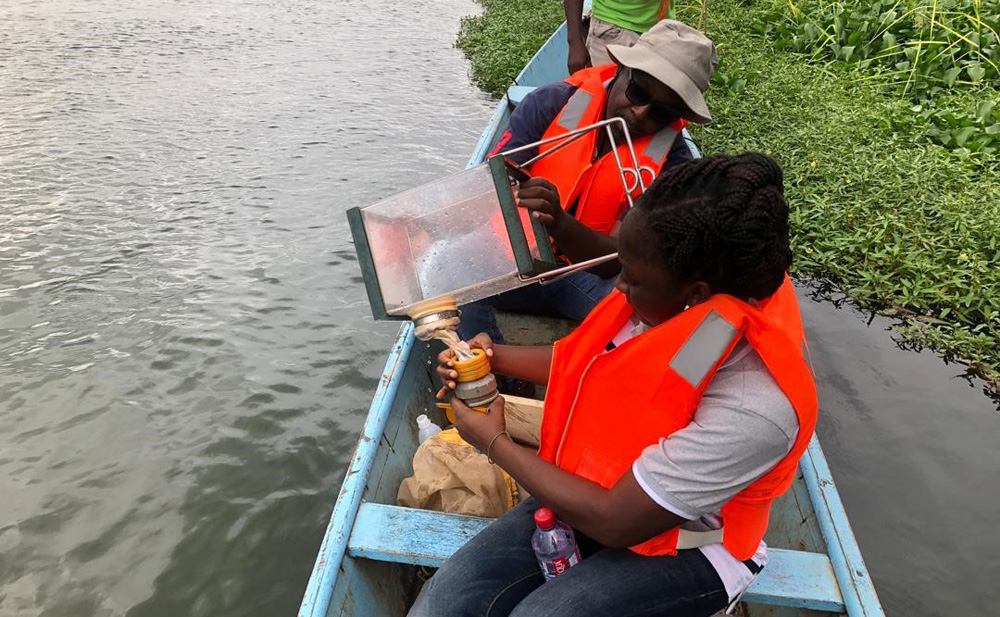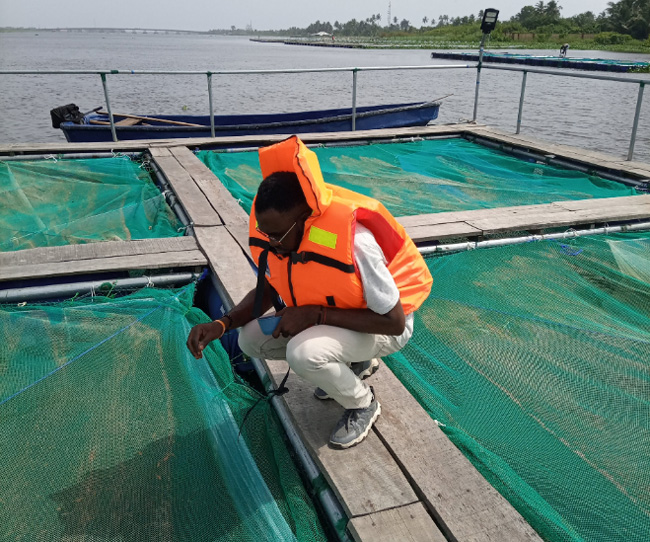A new sustainable way to fish for better incomes and diets in Nigeria and Ghana
IFAD Asset Request Portlet
Asset Publisher
A new sustainable way to fish for better incomes and diets in Nigeria and Ghana
Estimated reading time: 2 minutesDespite their vast water resources, Ghana and Nigeria import most of their fish, with demand outstripping supply. Local fish numbers are depleting due to overfishing and a lack of regulation. With many communities dependent on fishing as a source of income and food, less fish can have drastic knock-on effects, including reduced food security.
But there is a solution to meet growing demand. Cage aquaculture involves raising fish inside mesh enclosures in natural water bodies. This way of farming fish is more accessible since there is no need to procure land and farmers can use public waters. Cage aquaculture also has a lower carbon impact as it does not need expensive and energy-intensive water pumps.
Scaling up a new way of fishing
The Promoting Sustainable Cage Aquaculture in West Africa (ProSCAWA) project helps small-scale fishers in Ghana and Nigeria get started with this greener, cheaper method of fish farming. The project is funded by the China-IFAD South-South and Triangulation Cooperation Facility and supported by WorldFish, a research institute dedicated to transforming aquatic food systems.
 |
| Water samples being taken and tested in the ProSCAWA Fish Hub in Doffor, Ghana. ©IFAD/Yaw Vandyke |
Through workshops, field visits and training, fishers learn the skills needed to set up cage aquaculture operations. WorldFish then connects them with partners from the Global South and China who specialize in aquaculture products, making it easier for the fishers to acquire cages and other materials, while building business partnerships.
Participants also receive technical support and up-to-date information from WorldFish. Fishers in Ghana and Nigeria set up a group chat to share innovations and solve aquaculture challenges.
More fish means more food and more jobs
In the lakeside villages of Doffor in Ghana and Badagry in Nigeria, ProSCAWA is changing lives.
Eighteen cages on both sites house a specially-bred variety of tilapia which has a short maturity period. Tilapia grow faster than other local fish and freshwater cages can house more fish than ponds of a similar size, meaning these fisheries can earn more.
 |
| Daniel Chukwuma feeds tilapia fingerlings in Afowo lagoon, Nigeria. ©IFAD/Daniel Chukwuma |
The knock-on effects are widespread. The fisheries employ local young people to prepare the site and build the cages, helping to address high youth unemployment in the region. Other jobs along the value chain are created, from fish processing to transport. Fishmongers have local and affordable fish to sell. People have a local, plentiful and affordable supply of protein. Using a “training of trainers” approach, fishers are passing on what they know to others. As a result, the whole community is invested in the success and sustainability of the fish farms.
“ProSCAWA has brought hope to the people of Kotorkor,” says the Kotorkor community Chief in Ghana. “We are assured that our lives will improve. There will be food on our tables and money in our pockets.”
The project shows that it is possible to sustainably farm large numbers of fish in local water sources using cage aquaculture. The project is a model for rural coastline community development, especially among vulnerable communities in West Africa.
ProSCAWA is an example of how South-South and Triangular Cooperation can mobilise resources and knowledge from other countries in the Global South to transform food systems and improve livelihoods.
Learn more about IFAD’s work with fisheries and aquaculture.
Explore all our work in Nigeria and Ghana.
Find out more about SSTC.
Publication date: 12 September 2022